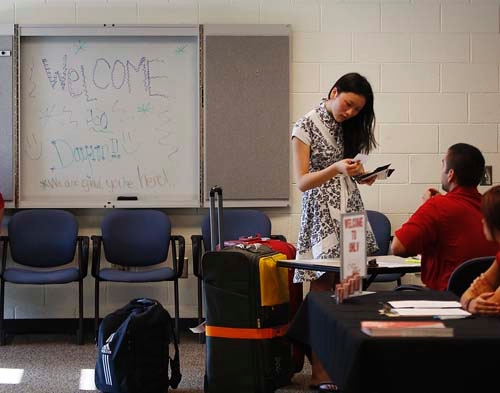Nevada colleges, universities battle over tuition distribution


Students paid Nevada’s colleges and universities more than $220 million in tuition and fees last year, but higher education officials say it’s not enough.
It’s not enough, they say, because the colleges and universities don’t really get to keep all that money. An outdated funding formula gets the blame.
"It becomes a particularly irritating issue with UNLV when you look at out-of-state tuition," higher education Chancellor Dan Klaich said. "That’s the elephant in the room."
Out-of-state students pay roughly $19,000 a year at the University of Nevada, Las Vegas, which is about three times what a Nevada resident pays.
And that’s a big deal at UNLV, which President Neal Smatresk said has students from all 50 states and 84 countries this year. The university’s highly regarded Harrah College of Hotel Administration is a particular draw.
Figures from the state’s higher education system show that UNLV collects 60 percent of all the out-of-state tuition paid in the state, $30 million of the entire $50 million.
But because of the way the higher education system is funded, the university doesn’t get to keep the $30 million.
Smatresk said the university actually loses $16 million or $17 million of that money every year. It essentially gets funneled back into the system’s budget and split by the rest of the schools, he said.
Which is partly why he is pushing for another tuition and fee increase, maybe as much as 10 percent.
After years of budget cuts, he said, the university has shrunk too much in some critical areas. Class sizes have grown too large. The university has become too dependent on part-time instructors.
Smatresk wants to use the extra money from another tuition increase to lessen those problems by hiring a few key faculty members.
But he said he would not ask for a tuition increase at all if the university were able to keep all the out-of-state tuition it collects. There would be no need.
Student fees have already increased 73 percent at UNLV since 2007, according to figures from the university. Students say they are tired of paying more money only to have the budgets cut anyway.
"I think if we see it on our campus, in projects or in more faculty, it gives students the feeling that they’re paying more for something better, not just the same thing," said Sara Saenz, the undergraduate student body president at UNLV.
That’s the crux of the issue. A formula is used to figure out how much to fund the state’s eight public higher education institutions. Except in dire budget-cutting years, that number determines how much each institution gets from the state.
Say, for example, the formula says UNLV should get $100. If the university collects $25 in student tuition and fees, the state gives the university the remaining $75.
In essence, the university loses state support for every dollar in tuition and fees it collects.
That problem has been coupled with a long-standing philosophy that Nevada’s higher education institutions should be cheaper than their counterparts in other states.
Crystal Abba, associate vice chancellor for academic and student affairs, said tuition and fees have long been tied to regional averages. Increases were typically linked to inflation.
But the policy was recently suspended so higher education officials could look into rewriting it, with a goal of making increases more predictable.
Klaich said he expects a tuition increase to come before the higher education system’s governing Board of Regents in December.
Saenz, the UNLV student president, said she thinks students would go for a small increase, perhaps 5 percent, but only if it were guaranteed to stay on campus, in the form of more scholarships, perhaps.
The funding formula is also being studied and could be rewritten. There is widespread agreement among higher education officials that the College of Southern Nevada, the largest higher education institution in the state, is underfunded when compared to its peers.
Klaich and others said rewriting the formula could help solve the issue of tuition and fees not being kept on campuses.
He said the way things are done now discourages, rather than encourages, the universities to recruit out-of-state students. If every dollar they collect in tuition means they lose a dollar in state funding, why bother collecting it?
"That doesn’t encourage looking at the optimum mix of residential and nonresidential students," Klaich said. "It doesn’t incentivize presidents at all."
And right now, as the state budget has been shrinking, state leaders are encouraging the higher education system to be more self-sufficient.
Klaich said UNLV’s argument "has some real merit," and should be part of the discussion when the funding formula is rewritten.
He intends to push for a bill in the next legislative session that allows the campuses to keep all of their out-of-state tuition without being penalized.
Contact reporter Richard Lake at rlake@reviewjournal.com or 702-383-0307.
WHAT STUDENTS PAYFees, surcharges and tuition collected in fiscal year 2011
All students
All of Nevada – $221,547,563
UNLV* – $91,393,984
Out-of-state students only
All of Nevada – $49,776,138
UNLV* – $29,907,000
*does not include dental or law schools
Source: Nevada System of Higher Education












